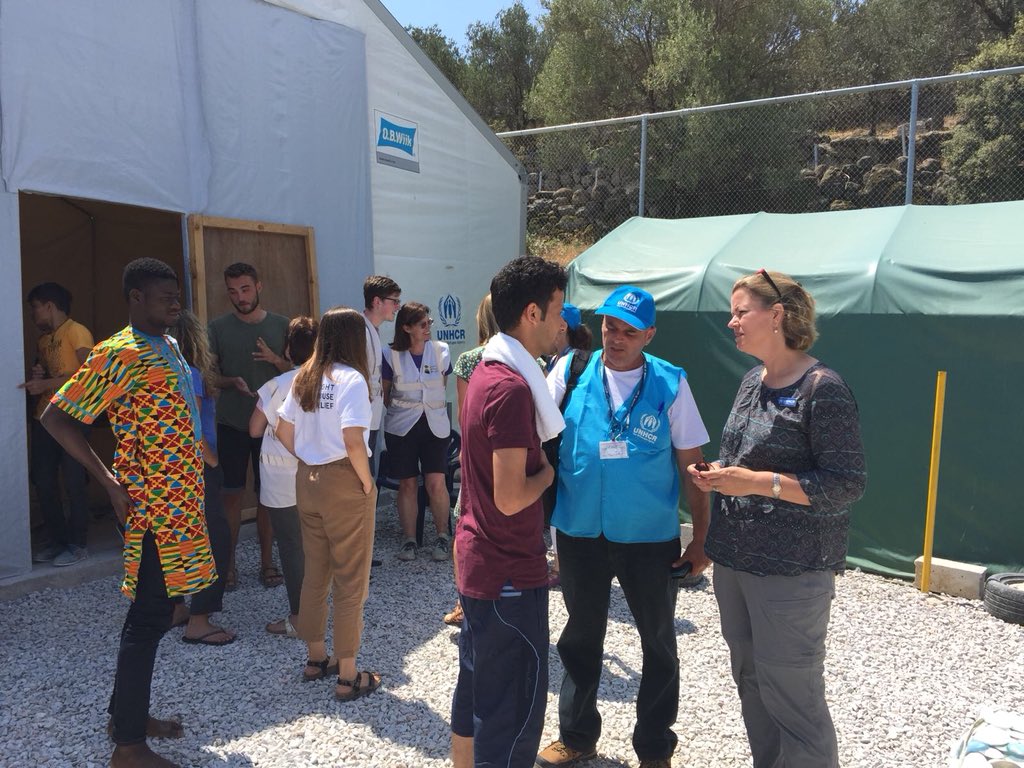UN Deputy High Commissioner for Refugees Kelly T. Clements, wrapping up a four-day visit to Greece, called for stepped up measures to ease overcrowding and improve security in tense reception centres for refugees and migrants on the Aegean islands. Her call for improvements came after seeing the harsh conditions in […]

UN Deputy High Commissioner for Refugees Kelly T. Clements meets new arrivals at UNHCR’s transit site in the North of Lesvos Island © UNHCR/Tamara Simidrijevic
UN Deputy High Commissioner for Refugees Kelly T. Clements, wrapping up a four-day visit to Greece, called for stepped up measures to ease overcrowding and improve security in tense reception centres for refugees and migrants on the Aegean islands.
Her call for improvements came after seeing the harsh conditions in the Moria Registration and Identification Centre (RIC) on Lesvos Island, which hosts some 6,000 refugees and migrants, about triple its capacity. People continue to arrive daily by sea to the islands, mainly Lesvos, exacerbating the problem.
Although sea arrivals have fallen sharply since the 2015-2016 emergency phase when more than a million people landed on the islands, 13,100 refugees and migrants have reached Greece by sea this year. UNHCR estimates 15,000 people are currently staying on the islands.
The government is struggling with insufficient and inadequate resources to cope with these arrivals, including people with specific needs and many families with young children. They are mainly from Syria, Iraq and Afghanistan.
“Greece is facing a crisis of reception, not a refugee crisis, and the government needs to tackle this by accelerating action to find accommodation, end overcrowding, boost services and improve living conditions,” said Clements, while reaffirming UNHCR’s support for government efforts to raise protection standards in Lesvos and elsewhere. She also stressed the need for solidarity in shouldering the responsibility.
New arrivals are restricted to the islands [geographic limitation], where they can spend months depending on their category for asylum processing. The pace of transfers to the mainland is also affected by the current shortage of accommodation on the mainland. Amid continuing arrivals, an estimated 2,700 people are waiting to be transferred despite having their geographic limitation lifted.
The government, with EU support, has been expanding or reopening old sites to try and meet the demand. Deputy High Commissioner Clements visited Schisto, one of the open sites. In Athens, she also met families living in accommodation provided by UNHCR under the EU-funded ESTIA programme. The programme, which has places for 25,000 people, will come under government management at the end of next year.
While on Lesvos, Clements joined a Hellenic Coastguard night-time patrol off the northern coast of Lesvos, visited the Kara Tepe municipal accommodation site; and met local officials.
The Deputy High Commissioner also held talks with senior officials, including Deputy Foreign Minister Ioannis Amanatidis. She was in Greece to assess the situation and review UNHCR’s operation in the post-emergency and transition phase.
Share on Facebook Share on Twitter